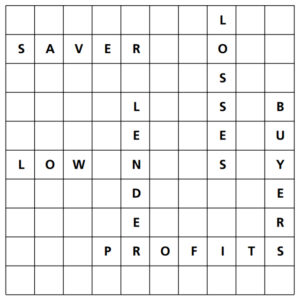A. Put the correct word in each space.
account back banknotes borrowed
change coin currency earn
lent note salary spend
sum wages waste win
1 In the USA, “quarters” (25 cents) and “dimes” (10 cents) are types of ………………………. .
2 In the United Kingdom, “a tenner” means a ten pound ………………………. .
3 The US dollar, the Yen and the Euro are types of ………………………. .
4 Hundred dollar bills and twenty pound notes are ………………………. .
5 2,000,000 Swiss francs is a large ………………………. of money.
6 I need to ………………………. some Euros into Australian dollars.
7 My friend ………………………. a hundred pounds from me.
8 I ………………………. a hundred pounds to my friend. When she can, she’ll pay me ………………………. .
9 I buy a lottery ticket every week, but I never ………………………. anything.
10 Most dentists ………………………. at least £30,000 a year.
11 ………………………. are paid to employees weekly. ………………………. are paid to employees monthly.
12 In business, you have to ………………………. money to make money.
13 A: Do you have a bank ……………………….?
B: Yes. I bank with the Bank of Scotland.
14 In my opinion, eating in expensive restaurants is a ………………………. of money.
B. Match the words on the left with the words on the right.
|
1 a small 2 an income 3 donate 4 high 5 make 6 pay by 7 pay in 8 winners and |
a a profit b amount of money c cash d cost of living e credit card f losers g money to charity h of £25,000 a year |
C. Choose the correct word.
1 Spain now uses the euro. Pesetas are no longer ………………………. .
a good money
b legal money
c legal tender
2 I bought a TV which doesn’t work. I’ll take it back to the shop to get ………………………. .
a my money returned
b a refund
c a repayment
3 In a shop, to get a refund, you usually have to show the ………………………. .
a receipt
b recipe
c payment ticket
4 I’m paying for my new car in 36 monthly ………………………. .
a instalments
b pieces
c parts
5 I earn a lot of money, but I have a lot of ………………………. .
a payouts
b expenses
c paying
6 Famous paintings are usually sold by ………………………. .
a bid
b highest price
c auction
7 In an auction, the item is sold to the person who makes the highest ………………………. .
a bid
b price
c offer
8 In Japan, the US dollar is ………………………. .
a foreign money
b strange money
c a foreign currency
9 In Britain, it’s not usual to discuss your personal ………………………. .
a money
b finances
c money arrangements
10 You can ………………………. a house and ………………………. a car.
a hire / rent
b hire / hire
c rent / rent or hire
11 Here’s the fifty dollars I ………………………. .
a owe you
b pay you back
c must return
12 The best things in life are ………………………. .
a free
b not for sale
c not bought and sold
D. Find the opposites of these words in the grid.

1 spender / ……………………….
2 borrower / ……………………….
3 winnings / ……………………….
4 losses / ……………………….
5 high prices / ………………………. prices
6 sellers / ……………………….
Answers
A: 1 coin, 2 note, 3 currency, 4 banknotes, 5 sum, 6 change, 7 borrowed, 8 lent / back, 9 win, 10 earn, 11 wages / salaries, 12 spend, 13, account, 14 waste
B: 1 b, 2 h, 3 g, 4 d, 5 a, 6 e, 7 c, 8 f
C: 1 c, 2 b, 3 a, 4 a, 5 b, 6 c, 7 a, 8 c, 9 b, 10 c, 11 a, 12 a
D: 1 save, 2 lender, 3 losses, 4 profits, 5 low, 6 buyers

